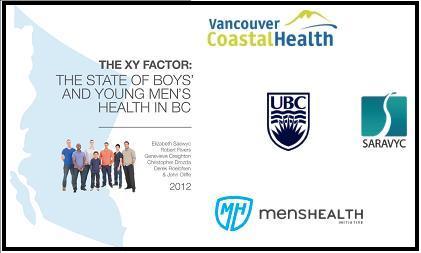This report brings together population-level data, where it exists, about the health indicators for boys (12 to 18 years) and young men (19 to 25 years) in British Columbia. Some of the data offers comparisons to girls and young women, while other data examines trends in health issues over time, or highlights different groups of young men who experience unequal risks and opportunities for health. Some of these are specific health conditions or illnesses, while others are environmental or risk behaviours that are strongly linked to illness, disability, or even death for boys and young men. They may affect boys’ and young men’s health while they are young, or set patterns that can lead to poor health or early mortality among older men. Together these data provide a picture of the key factors that contribute to the health status of boys and young men in Western Canada, and can serve as a source of information to help guide priority setting for health promotion and policy. Key issues include: Violence victimization, whether in the form of physical and sexual abuse, or bullying, or physical assaults and fighting, is an important contributor to a variety of the health issues identified in this report.
Note: Funding for the XY factor report was provided by the Canadian Institutes of Health Research and Vancouver Coastal Health. For more information, visit the UBC School of Nursing website at: http://www.nursing.ubc.ca/. Click on ‘View/Open’ to read the rest of the report in cIRcle at: http://hdl.handle.net/2429/43707.
Did you know?
Two of the 76 students who received honorary degrees at a special ceremony held during UBC’s 2012 spring congregation in recognition of the Japanese Canadian students whose university experience was disrupted in 1942 were from the UBC School of Nursing. (see Nursing alumni news at: http://www.nursing.ubc.ca/Alumni/AlumniNews.aspx?id=28). View and/or download “A degree of justice” video about the 76 students in cIRcle at: http://hdl.handle.net/2429/43625.

